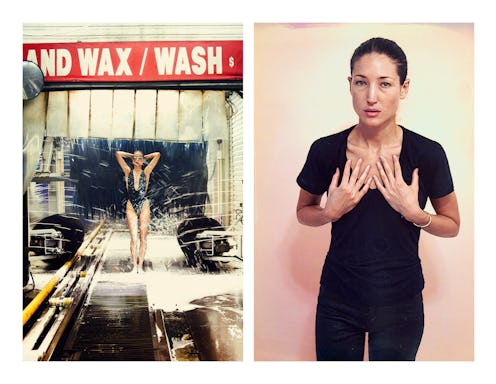
Jarring juxtapositions of pornographic poses and emotive portraits fill the pages of Andrea Mary Marshall's Feminist Calendar — but one thing they all have in common they feature the artist herself. In each pair of photographs, which are on display in the Garis & Hahn Gallery in downtown Manhattan through Nov. 14, Marshall uses her own body to spark discussion about the media's sexualization of women.
Marshall, a New York-based photographer, told Mic that she took all the photos herself with a timed shutter. The sexualized versions, she said, are inspired by the famous Pirelli Calendar, known for provocative photographs of conventionally beautiful women, and meant to "emphasize the idea of self-objectification." However, by putting photos of herself in everyday settings and attire next to them, she aims to make a statement about the virgin-whore complex and show that women can be both highly sexualized and relatably human. "Both images are me, and one is not better than the other," she told Mic.
The Feminist Calendar straddles a curious line. On the one hand, some of the images, such as one featuring tire marks over Marshall's body, exemplify the violence and dehumanization with which many forms of media subjugate women. If we interpret Marshall's re-creations as critiques of this imagery, the contrasting clothed portraits, with visible emotions on Marshall's face and in her body language, appear to remind us that the woman in the sexualized photographs is human, despite how they depicts her.
One the other hand, though, Marshall said she considers both types of photos in the calendar "empowering and self-determined" for the reason that she planned them out and starred in them herself. And while it's important to understand how reducing women to objects can lead to body shame and justify violence against them, we also need to know that how a woman chooses to present herself has nothing to do with how much dignity she deserves, especially when many still consider revealing outfits invitations for harassment or assault. (Just in case anyone need a reminder, no one is ever "asking for it," no matter what they look like.)
Like the two photos on each page, these two interpretations coexist simultaneously and in dialogue with each other. Ultimately, the tension between the calendar's dual aims of critiquing and reclaiming sexualized images of women reflects a larger debate within third-wave feminism. Can the types of imagery previously used against women now be used to empower them, as long as women craft these images themselves? I don't have the answer, but the Feminist Calendar definitely helps us ask the question.
View more of the photographs on Andrea Mary Marshall's website and Instagram.
Images: Courtesy of Andrea Mary Marshall